Israeli Public Opinion on Drafting Haredi Yeshiva Students
An analysis of Israeli public opinion on the issue of drafting ultra-Orthodox yeshiva students, as it is revealed in polls conducted by IDI's Guttman Center for Surveys at different points from 1986 through 2009.
Introduction
Over the years, surveys conducted by the Guttman Center have examined Israeli public opinion on the issue of drafting yeshiva students into the military. Here we present these positions and examine how certain socio-demographic characteristics are related to the tendency to oppose or support drafting yeshiva students. Finally, we examine public opinions on gender separation in the IDF as part of the demands of religious and Haredi bodies.
Levels of Support for Drafting Yeshiva Students into the Army
To investigate how many of the respondents supported drafting yeshiva students, we examined five different points in time between 1986 and 2009: Two Guttman Center Surveys from 1986 and 1987 and three Guttman Center-Avi Chai surveys on "Beliefs, Observance, and Values of Israeli Jews" that were conducted in 1991, 1999, and 2009. The former asked: "In your opinion, should the Knesset repeal the law that allows young religious people to be released from military service?" while the latter asked: "In your opinion, should yeshiva students be drafted into the IDF?" (see Figure 1).
Figure 1: Agree that yeshiva students should be drafted
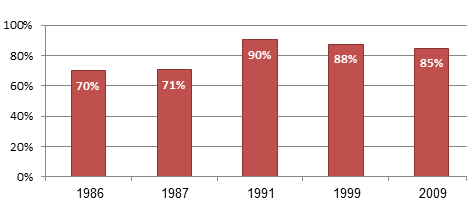
Based on: The Continuing Survey on Public Problems conducted by the Guttman Center for Surveys in 1986, 1987 (Jewish sample); Guttman-Avi Chai Surveys, 1991, 1999, and 2009 (Jewish sample).
As Figure 1 shows, over the years a vast majority of the Jewish Israeli public (70% or more) has supported drafting yeshiva students. Likewise, a trend of increased support in the early nineties is visible, as well as a moderate decrease in support from 1991 to 2009.
Self-defined Religiosity and Support for Drafting Yeshiva Student
A variable found to greatly influence support for drafting yeshiva students is self-definition of religiosity (see Figure 2). In 1999 and 2009, over 90% of respondents who defined themselves as secular or traditional supported drafting yeshiva students compared to 73% of religious respondents, and only 17% of Haredi respondents. This large gap is understandable because a change in the situation most affects the lives of the Haredi community. Even though self-defined religiosity was measured differently in 1986–1987 and in 1991, all these surveys still showed this variable as having a significant effect on support for drafting yeshiva students.
Figure 2: Agree that yeshiva students should be drafted,
by self-defined religiosity
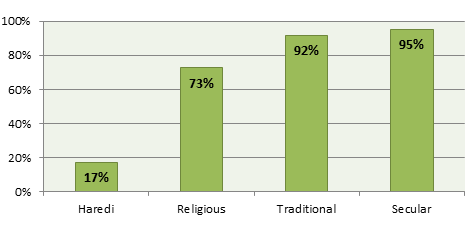
Based on: Guttman-Avi Chai surveys, 1999 and 2009 (Jewish sample, by self-defined religiosity)
Political Identification and Support for Drafting Yeshiva Students
Another variable that has some bearing on views regarding drafting yeshiva students is self-identification with the left or right. This variable was only examined in the 2009 survey (see Figure 3). We found a significant difference between the level of support for drafting yeshiva students among those who identified with the political center and left (91% pro-draft) and the level of support among those who identified with the right (76% pro-draft).
Figure 3: Agree that yeshiva students should be drafted,
by political self-identification
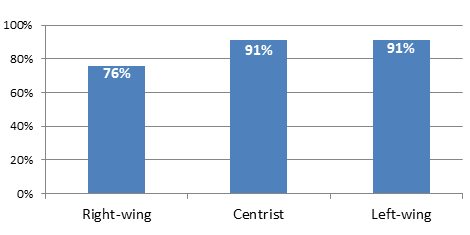
However, a more in-depth examination reveals that this connection may be deceptive. Since most of those who define themselves as Haredi identify with the right-wing camp, and most of those identifying as Haredi oppose the drafting of yeshiva students, there is a false impression that there is a connection between political identification and support for drafting yeshiva students. Further supporting this finding, when we removed those who identified themselves as Haredi from the analysis, the differences between the political camps were substantially smaller. When we also removed those who identified themselves as religious, the differences disappeared completely (see Figure 4)
Figure 4: Agree that yeshiva students should be drafted,
by political identification (secular, traditional, and religious only)
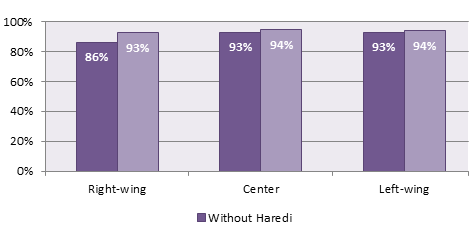
Based on: Guttman-Avi Chai Survey, 2009 (Jewish sample, by political self-identification)
Gender and Support for Drafting Yeshiva Students
In the 2009 survey we found that gender was an additional variable influencing position on drafting yeshiva students: 89% of women supported drafting yeshiva students, compared to 80% of men (see Figure 5). Interestingly, the effect of gender was not identical across different religious groups. Among the secular and traditional there were no significant differences based on gender. In contrast, there were significant differences between genders among those who identify as Haredi or religious; in these two groups, women supported drafting yeshiva students much more than men. It should be noted that in the 1999 survey, there were no significant differences between men and women on this issue.
Figure 5: Agree that yeshiva students should be drafted,
by self-defined religiosity and gender
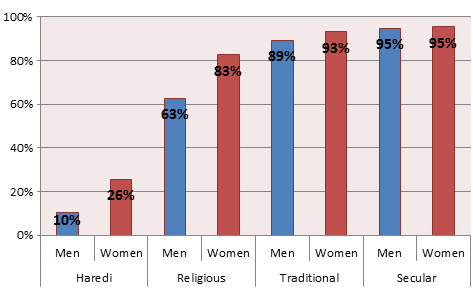
Based on: Guttman-Avi Chai, 2009 (Jewish sample, by self-defined religiosity and gender)
One possible explanation for this clear gender gap in the Haredi and religious communities is that because drafting Haredi or religious women is not under consideration, this allows women to regard drafting Haredim more "objectively." A second possibility is that Haredi and religious women see the socio-economic advantage in the IDF draft and the possibilities that such a measure could open up to the men in their communities. A third possibility is that Haredi men view themselves as representatives of their community and, thus, internalize the need to reflect the official position of the Haredi community on the draft. By contrast, Haredi women are freer to express opinions that deviate from the official position.
Jewish vs. Arab Support for Drafting Yeshiva Students
The Peace Index survey from July 2007 allows us to examine the differences between Jewish and Arab public opinion on drafting yeshiva students (see Figure 6). The question in this survey was formulated slightly differently: "How much does the fact that yeshiva students abstain from the draft seem justified to you?" A significant gap between Jewish and Arab respondents is apparent: 72% of the Jews do not justify Haredi abstention from the military draft, compared to 57% among Arabs. A possible explanation for this gap could be that some of the Arabs fear that if Haredim are obligated in the draft, it will increase similar requirements for drafting Arabs or lead to the institutionalization of national civil service for Arabs.
Figure 6: Agree that Haredi abstention from the draft is not justified,
by national identity
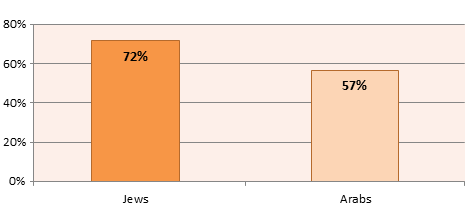
Based on: Peace Index, July 2007 (Jewish and Arab samples)
In this survey, as well, we found significant gaps between Haredi, religious, traditional, and secular responses (among Jews): Only 5% of Haredim see the abstention of yeshiva students from the draft as wrong, compared to 54% among religious respondents, 73% among traditional, and 87% among secular (see Figure 7). Indeed, the tendency to justify Haredi abstention from the draft increases the more the respondents tends to see themselves as part of the religious and Haredi communities. Additionally, this survey shows that an overall majority among the Israeli public supports drafting Haredim, and this majority crosses national, ethnic, gender, and political lines. Arabs and Jews, Mizrahi and Ashkenazi, men and women, wealthy and poor, right-wing and left-wing – all support drafting Haredim into the military.
Figure 7: Agree that Haredi abstention from the draft is not justified,
by self-defined religiosity
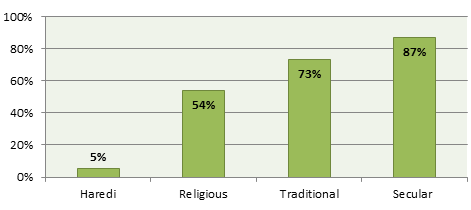
Based on: Peace Index, July 2007 (Jewish sample, by self-defined religiosity)
Opposition to Separation of Men and Women on Religious Grounds at Military Events
The issue of drafting Haredim has been foremost on the Israeli public agenda since the decision of the High Court of Justice to not allow the Tal Law to be extended and since it determined that as of August 2012, the draft exemption for "yeshiva students for whom learning is their profession" will expire unless a new draft law is enacted that satisfies general criteria of equality. In light of the Israeli public's sweeping support for drafting Haredim, it is interesting to analyze its position on the different proposals for Haredi and religious army service. Is the Israeli public, mainly the secular and traditional, prepared to agree to compromise solutions that may violate fundamental humanistic and liberal principles—for example, gender separation in the army—in order to achieve the goal of drafting Haredim into the military?
A "Peace Index" survey conducted by the Guttman Center for Surveys in October 2011 examined this issue. The survey asked: "In your opinion, is it justified for the IDF to hold events with separation between male and female soldiers because of religious demands?" 64.5% of respondents answered that gender separation in this circumstance was not justified, compared to 29.5% who justified it, and 6% who did not answer the question.
Analyzing the results by different populations, grouped into new immigrants, veteran Israeli Jews and Israeli Arabs, revealed that new immigrants were the group most opposed to separation between male and female soldiers (81% opposed). We suspect this was because most of the immigrants from the FSU hold distinctly secular views. Veteran Israeli Jews were also significantly opposed to the separation (69%), while among Arabs a small majority was opposed (55%).
Figure 8: Opposed to gender separation at military events,
by population group
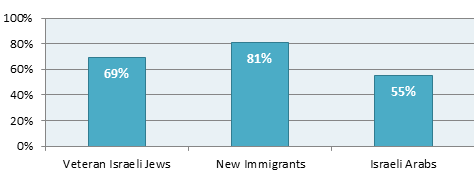
Based on: Peace Index, October 2011 (Jewish and Arab samples by population group)
An analysis of the Jewish population divided into self-defined religious groups (Figure 9) revealed that Haredim fully support gender separation at army events for religious reasons (0% opposed separation), while religious are divided on the issue (50% opposed), and traditional and secular are greatly opposed to separation (71% and 86%, respectively).
Figure 9: Opposed to gender separation at military events,
by self-defined religiosity
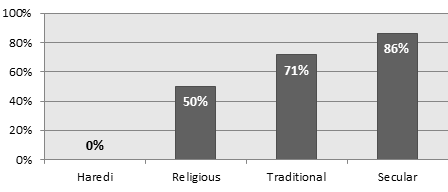
Based on: Peace Index, October 2011 (Jewish and Arab samples by population group)
Opposition to Removing Female Soldiers from Haredi Army Units
A further question examined another aspect of gender separation in the IDF: "Should female soldiers be removed from units in which Haredi soldiers serve in order to allow Haredim to serve?" (see Figure 10). It is noteworthy that this only refers to gender separation in the new Haredi units established in recent years to allow Haredim and Haredi-Leumi (Zionist Haredim) to serve under conditions acceptable to a number of rabbis (Nahal Haredi Battalion – "Netzach Yehuda"). Data shows that the public was divided on this question: 46% of the respondents opposed gender separation in Haredi units, while 44% supported this type of separation, and 10% did not answer the question.
Examining the results further showed that this division existed for both veteran Israeli Jews and new immigrants. About half of the Israeli public accepted the claim that it is necessary to create special service conditions for Haredim that suit their beliefs and customs, while the other half preferred gender equality and sees it as the priority. Among Arabs, there was a majority of 59% who opposed distancing women from Haredi units.
Figure 10: Opposed to distancing female soldiers from Haredi units
in the IDF, by population group
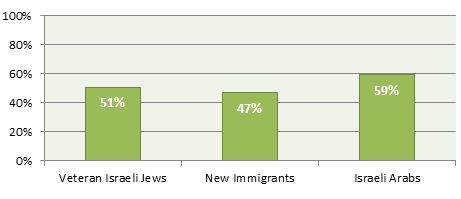
Based on: Peace Index, October 2011 (Jewish and Arab samples by population group)
Comparing the results by religious self-definition strengthens this finding (see Figure 11). A majority of Haredi and religious respondents supported distancing women from Haredi units. Among traditional and secular respondents, while the majority opposed gender separation (59% and 55% respectively), there is a large minority of more than 40% who supported it.
Figure 11: Opposed to distancing female soldiers from
Haredi units in the IDF, by self-defined religiosity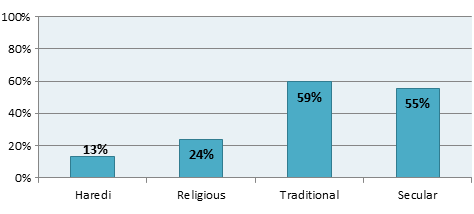
Based on: Peace Index, October 2011 (Jewish population by self-defined religiosity
Summary
The survey data shows that there is much support in the Israeli public for drafting Haredim into the military, widespread opposition to gender separation in IDF units, and ambivalence toward a similar separation in military units designated for Haredim.
